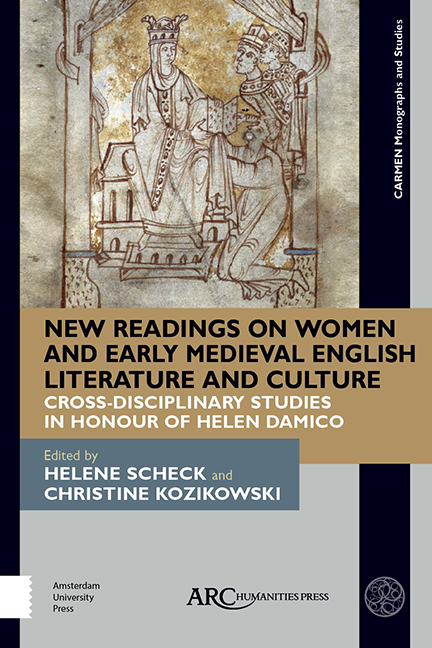 New Readings on Women and Early Medieval English Literature and Culture
New Readings on Women and Early Medieval English Literature and Culture Book contents
- Frontmatter
- Contents
- List of Illustrations
- List of Abbreviations
- Note from the Editors
- Introduction: Feminism and Early English Studies Now
- PART ONE LITERACY AND MATERIAL CULTURE
- PART TWO ENGENDERING MARRIAGE AND FAMILY
- PART THREE WOMEN OF THE BEOWULF MANUSCRIPT
- PART FOUR WOMEN AND ANGLO-SAXON STUDIES
- Select Bibliography
- Index of Manuscripts
- General Index
4 - Imagining the Lost Libraries of Anglo-Saxon Double Monasteries
Published online by Cambridge University Press: 20 November 2020
- Frontmatter
- Contents
- List of Illustrations
- List of Abbreviations
- Note from the Editors
- Introduction: Feminism and Early English Studies Now
- PART ONE LITERACY AND MATERIAL CULTURE
- PART TWO ENGENDERING MARRIAGE AND FAMILY
- PART THREE WOMEN OF THE BEOWULF MANUSCRIPT
- PART FOUR WOMEN AND ANGLO-SAXON STUDIES
- Select Bibliography
- Index of Manuscripts
- General Index
Summary
IN RECONSTRUCTING THE lost libraries of Anglo-Saxon England, Michael Lapidge relies on three means by which he establishes the imagined contents of what were once significant collections: inventories of books, extant manuscripts, and citations within authors’ works. He draws on ninth-, tenth-, and eleventh-century inventories; extant manuscripts dating from as early as the mid-eighth century; and citations of what he calls the principal writers, including Aldhelm, Bede, Alcuin, Wulfstan, and Ælfric. As a result, Lapidge's methodology illustrates that we can have some confidence about the general shape of monastic libraries in the later Anglo-Saxon period. We are faced with a number of problems, however, when trying to identify those that existed in the seventh and eighth centuries. There are no inventories from this period and few manuscripts of the type Lapidge defines as library material: that is, those “books acquired and arranged for the purposes of study and the pursuit of knowledge.” It is only because Bede was such a prolific writer and because his works were eagerly copied and used by Continental missionaries that his oeuvre is well-documented, and the library at his community of Monkwearmouth-Jarrow can be broadly sketched. It is a harder task to do so for Alcuin's library at York but there is some indication, based on the books he cites in his letters and in two works, De laude Dei and Versus de patribus, regibus et sanctis Euboricensis ecclesiae, and on the work he effected in the Carolingian school at Aachen. Little, however, is known about the books available to Aldhelm, whose library at Malmesbury is assessed almost entirely by his citations of others. Lapidge's conclusions are compelling, especially about the range of pre-Christian and Christian materials circulating in Anglo-Saxon England, but we are limited by the reception of textual materials when determining the types of library books available.
Simultaneous in date to Lapidge's investigation of Anglo-Saxon libraries and similar in approach is Rolf H. Bremmer, Jr.'s study of the transfer of knowledge as part of the Anglo-Saxon missions. In focusing on the Christian missions in Germania, Bremmer enhances Lapidge's discussion of library books by also considering liturgical and other devotional materials. Bremmer's study focuses on fragmentary manuscript survivals at Werden (before 809) and a book list of a clericus who had likely studied at the minster school in Utrecht (ca. 828).
- Type
- Chapter
- Information
- New Readings on Women and Early Medieval English Literature and CultureCross-Disciplinary Studies in Honour of Helen Damico, pp. 75 - 94Publisher: Amsterdam University PressPrint publication year: 2019


